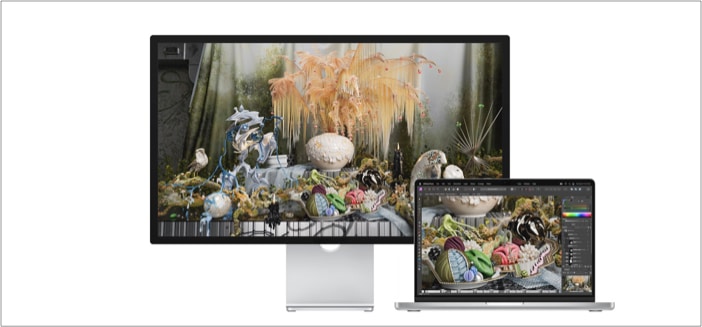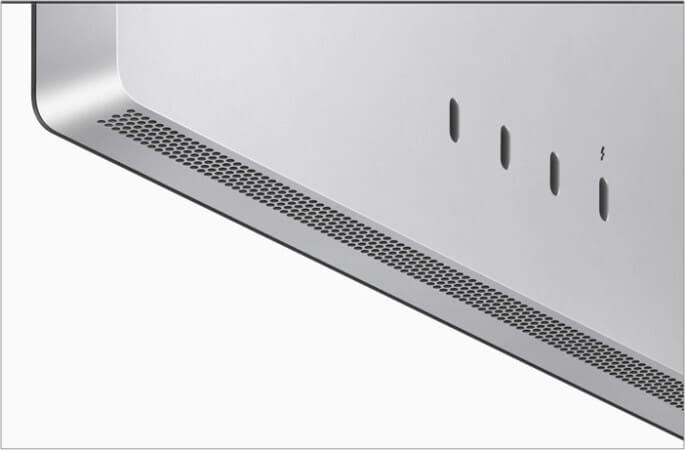Apple has finally filled the void for a less expensive display. The XDR Pro display offers all the bells & whistles; however, it is steeply-priced. The all-new Apple Studio Display is a more affordable 5K monitor built for creators.

The Studio Display is different than Apple’s previous monitors. You get a 27-inch panel, stunner looks, impressive hardware, and much more. Let us take a closer look at Apple Studio Display and what it offers.
Apple Studio Display features and specifications
At the heart of Studio Display is a 27-inch 5K Retina display. The display supports more than one billion colors, P3 wide color, and 14.7 million pixels. Apple Studio Display offers a class-leading brightness of up to 600 nits.
The True Tone technology will adjust display parameters to match the lighting conditions. Unfortunately, Studio Display misses out on HDR and ProMotion variable refresh rates. If your setup is near a window, consider getting anti-reflective Nano Texture coating. However, the display already comes with a glossy, anti-reflective coating.
Moreover, it runs on A13, which is disappointing considering that A15 powers the newer iPhones. But to balance it up, the Studio Display comes equipped with a whopping 12MP ultra-wide camera and supports Center Stage!
Here’s a roundup of features at a glance:
- 27-inch display
- 5K resolution
- A13 Bionic chip
- 12MP Ultra-wide camera with Center Stage
- 6 Speaker sound system
- Spatial Audio
- Hey Siri
- 1 TB3 port
- 3 USB-C ports
Design

Studio Display looks sleek with narrow bezels and aluminum encasing. The bottom-facing speaker cutouts are hidden from plain sight. The Studio Display lets you tilt or change the display angle by 30-degrees. Apple has taken the flak for not offering height adjustment on iMac.
Meanwhile, the Studio Display with height adjustment would set you back by another $399. Yes, you heard it right! Unlike the Pro Display XDR, the Studio Display is sold with a stand. You can also choose a VESA mount adapter for better flexibility.
Ports and connectivity

Apple Studio Display is compatible with all Mac. You get three USB-C ports and a Thunderbolt 3 port at the back (not Thunderbolt 4). Interestingly, you can fast charge the new MacBook Pro with a 96W USB-C cable. Apple says you can connect up to three Studio Displays with a MacBook Pro.
Moreover, you can also connect iPad Pro and iPad Air 5 using Thunderbolt!
A13 Bionic chip: Camera and audio
Apple has tossed in an A13 Bionic chip to the mix. Yes, it is the same chipset that does duty on iPhone 11. The chipset is meant to drive a 12MP webcam, Center Stage, Spatial Audio, and Hey Siri.
Desktop speakers tend to stick out like a sore thumb. You no longer have to worry about it with the Apple Studio Display. The display packs a six-speaker setup with force-canceling woofers, Dolby Atmos and Spatial Audio.
I am skeptical of how well spatial audio would work on a monitor. A three-mic array takes care of audio input. The company touts it as “the best audio system created for Mac.”
Apple Studio Display pricing and availability
Apple Studio Display starts at $1599. A fully loaded display with nano-texture, tilt- and height-adjustable stand costs $2,299. Add Nano-texture glass, and it increases to $1899.
You can order the new Studio Display from Apple’s online store. It will also be available in Apple Authorized resellers and select Apple Stores starting March 18.
Is Apple Studio Display the right choice for creators?
Apple is billing Studio Display as the ultimate choice for creators. The display starts at $1599 and is very similar to the one on iMac. Meanwhile, the M1 iMac starts at $1300. The question is whether a slightly larger Studio Display is worth paying a premium. Especially since it is just a display while iMac is a whole computer.
Moreover, MacBook Pro with an M1 chipset already offers superior ISP, audio processing, and much more. I am not sure why Apple had to plonk in an A13 chipset.
Most creators I know already own a high-end audio and video setup. Not sure if they would ever feel the need for Apple Display speakers and webcam.
Apple Studio Display supports any Mac with Intel or Apple Silicon. It would have been great if Apple had included an HDMI port and USB 3.0 instead of USB 2.0. I had hoped for a mini-LED panel instead of an edge-lit backlight. However, creators invested in the Apple ecosystem can consider Apple Studio Display.
What are your thoughts about the Apple Studio Display? Let me know in the comments below.
Read more:
